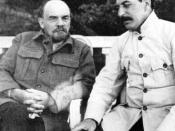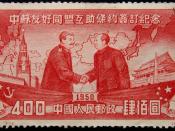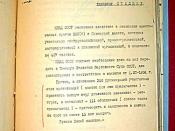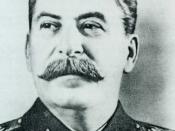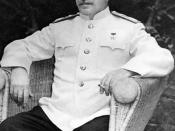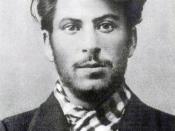Joseph StalinJoseph Stalin, whose real name was Iosef Vissarionovich Dzhugashvili, was born in Georgia on December 21st 1879. His father was a poor, unsuccessful shoemaker, who was an alcoholic and beat Joseph. He died in a fight when Joseph was only 11. Joseph's mother was a washerwoman who hoped her son would become a priest. His early nickname was Koba, a fictional mountain bandit and rebel.
When he was 14 he went to the Tiflis Theological Seminary. He never graduated, instead he left and became a full-time revolutionary organizer. When the Social Democrats split into 2 groups in 1903,the Bolsheviks and the Mensheviks, Stalin supported the more radical Bolsheviks and their leader V.I. Lenin. When Lenin died in 1924, Stalin took control. He used his control to build a policy called "socialism in one country"ÃÂ and to crush his opponents. By 1928, Trotsky had been banished.
Once he got control he immediately began to change agriculture and industry.
He believed that the Soviet Union was one hundred years behind the West and had to catch up as quickly as possible. He forced agriculture to be concentrated and by the mid-1920's there were about 25 million farms in the Soviet Union but many produced only enough to feed the families who worked them. Those who opposed Stalin's will were put to death by execution or famine. Soviet industrialization was achieved by means of 3 5-year plans.
Stalin began to fear the growing power of Nazi Germany. In 1938 he signed the Nonaggression pact with Hitler which bought the Soviet Union 2 years of noninvolvement in World War II. After Germany invaded Poland at the start of WWII, Stalin wanted to expand the Soviet influence in Europe by occupying eastern Poland and attacking Finland. The nonagression pact with Germany lasted until German troops invaded the Soviet Union in June of 1941. After the invasion the USSR became a member of the Grand Alliance and as war leader was also given the title of generalissimo. He took part in the conferences of Tehran, Yalta, and Potsdam.
From 1945 until he died in 1953, things weren't great. Returned prisoners of war were incarcerated in concentration camps and new duties on peasants reduced many to the status of serfs. Stalin also conducted foreign policies, which contributed to the cold war. Early in 1953, he announced he had found a plot among the Kremlin's corps of doctors and many feared another purge. But Stalin mysteriously died on March 5, 1953.
